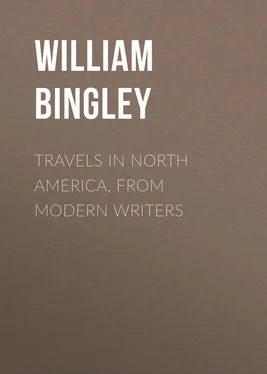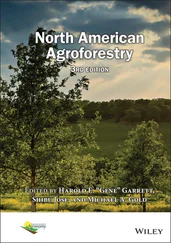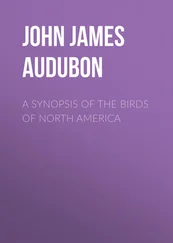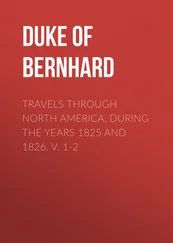William Bingley - Travels in North America, From Modern Writers
Здесь есть возможность читать онлайн «William Bingley - Travels in North America, From Modern Writers» — ознакомительный отрывок электронной книги совершенно бесплатно, а после прочтения отрывка купить полную версию. В некоторых случаях можно слушать аудио, скачать через торрент в формате fb2 и присутствует краткое содержание. Жанр: foreign_antique, foreign_prose, Путешествия и география, на английском языке. Описание произведения, (предисловие) а так же отзывы посетителей доступны на портале библиотеки ЛибКат.
- Название:Travels in North America, From Modern Writers
- Автор:
- Жанр:
- Год:неизвестен
- ISBN:нет данных
- Рейтинг книги:3 / 5. Голосов: 1
-
Избранное:Добавить в избранное
- Отзывы:
-
Ваша оценка:
- 60
- 1
- 2
- 3
- 4
- 5
Travels in North America, From Modern Writers: краткое содержание, описание и аннотация
Предлагаем к чтению аннотацию, описание, краткое содержание или предисловие (зависит от того, что написал сам автор книги «Travels in North America, From Modern Writers»). Если вы не нашли необходимую информацию о книге — напишите в комментариях, мы постараемся отыскать её.
Travels in North America, From Modern Writers — читать онлайн ознакомительный отрывок
Ниже представлен текст книги, разбитый по страницам. Система сохранения места последней прочитанной страницы, позволяет с удобством читать онлайн бесплатно книгу «Travels in North America, From Modern Writers», без необходимости каждый раз заново искать на чём Вы остановились. Поставьте закладку, и сможете в любой момент перейти на страницу, на которой закончили чтение.
Интервал:
Закладка:
There are, in New York, many excellent private dwellings, built of red painted brick, which gives them a peculiarly neat and clean appearance. In Broadway and Wall-street, trees are planted along the side of the pavement. The City Hall is a large and elegant building, in which the courts of law are held. Most of the streets are dirty: in many of them sawyers prepare their wood for sale, and all are infested with pigs.
On the whole, a walk through New York will disappoint an Englishman: there is an apparent carelessness, a laziness, an unsocial indifference, which freezes the blood and disgusts the judgment. An evening stroll along Broadway, when the lamps are lighted, will please more than one at noonday. The shops will look rather better, but the manners of the proprietors will not greatly please an Englishman: their cold indifference may be mistaken, by themselves, for independence, but no person of thought and observation will ever concede to them that they have selected a wise mode of exhibiting that dignified feeling.
[There is, in New York, a seminary for education, called Columbia College . This institution was originally named "King's College," and was founded in the year 1754. Its annual revenue is about 4000 dollars. A botanic garden, situated about four miles from the city, was, not long ago, purchased by the state, of Dr. Hosach, for 73,000 dollars, and given to the college. The faculty of medicine, belonging to this institution, has been incorporated under the title of "The College of Physicians and Surgeons of the University of New York."]
The Town Hall of this city is a noble building, of white marble; and the space around it is planted and railed off. The interior appears to be well arranged. In the rooms of the mayor and corporation, are portraits of several governors of this state, and of some distinguished officers. The state rooms and courts of justice are on the first floor. In the immediate vicinity of the hall is an extensive building, appropriated to the "New York Institution," the "Academy of fine Arts," and the "American Museum." There are also a state prison, an hospital, and many splendid churches.
When a traveller surveys this city, and recollects that, but two centuries since, the spot on which it stands was a wilderness, he cannot but be surprised at its present comparative extent and opulence.
With regard to trades in New York, Mr. Fearon remarks that building appeared to be carried on to a considerable extent, and was generally performed by contract. There were many timber, or lumber-yards, (as they are here called,) but not on the same large and compact scale as in England. Cabinet-work was neatly executed, and at a reasonable price. Chair-making was an extensive business. Professional men, he says, literally swarm in the United States; and lawyers are as common in New York as paupers are in England. A gentleman, walking in the Broadway, seeing a friend pass, called out to him, "Doctor!" and immediately sixteen persons turned round, to answer the call. It is estimated that there are, in New York, no fewer than 1500 spirit shops, yet the Americans have not the character of being drunkards. There are several large carvers' and gilders' shops; and glass-mirrors and picture-frames are executed with taste and elegance. Plate-glass is imported from France, Holland, and England. Booksellers' shops are extensive; but English novels and poetry are the primary articles of a bookseller's business. Many of the popular English books are here reprinted, but in a smaller size, and on worse paper than the original. There are, in this city, a few boarding-schools for ladies; but, in general, males and females, of all ages, are educated at the same establishment. No species of correction is allowed. Children, even at home, are perfectly independent; subordination being foreign to the comprehension of all persons in the United States.
The rents of houses are here extremely high. Very small houses, in situations not convenient for business, and containing, in the whole, only six rooms, are worth from £.75 to £.80 per annum; and for similar houses, in first-rate situations, the rents as high as from £.160 to £.200 are paid. Houses like those in Oxford-street and the best part of Holborn, are let for £.500 or £.600 pounds per annum.
Provisions are somewhat cheaper than in London; but most of the articles of clothing are dear, being chiefly of British manufacture. With regard to religion in the United States, there is legally the most unlimited liberty. There is no established religion; but the professors of the presbyterian and the episcopalian, or church of England tenets, take the precedence, both in numbers and respectability. Their ministers receive each from two to eight thousand dollars per annum. All the churches are said to be well filled. The episcopalians, though they do not form any part of the state, have their bishops and other orders, as in England.
Mr. Fearon remarks, generally, respecting the United States, that every industrious man may obtain a living; but that America is not the political elysium which it has been so floridly described, and which the imaginations of many have fondly anticipated.
In the courts of law there appears to be a perfect equality between the judge, the counsel, the jury, the tipstaff, and the auditors; and Mr. Fearon was informed that great corruption exists in the minor courts.
New York is called a "free state;" and it may perhaps be so termed theoretically, or in comparison with its southern neighbours; but, even here, there are multitudes of negroes in a state of slavery, and who are bought and sold as cattle would be in England. And so degrading do the white inhabitants consider it, to associate with blacks, that the latter are absolutely excluded from all places of public worship, which the whites attend. Even the most degraded white person will neither eat nor walk with a negro.
Long Island is a part of the state of New York, one hundred and twenty miles in length, and twelve in breadth. It is chiefly occupied by farmers; and is divided into two counties.
Mr. Fearon made several excursions into the state of New Jersey , situated opposite to that of New York, and on the southern side of the river Hudson . The valleys abound in black oaks, ash, palms, and poplar trees. Oak and hickory-nut trees grow in situations which are overflowed. The soil is not considered prolific. Newark is a manufacturing town, in this province, of considerable importance, and delightfully situated. It contains many excellent houses, and a population of about eight thousand persons, including slaves. Carriages and chairs are here made in great numbers, chiefly for sale in the southern markets.
For the purpose of visiting the property of a gentleman who resided in the vicinity of Fishkill , a creek somewhat more than sixty miles from New York, Mr. Fearon took his passage in a steam-boat. He paid for his fare three dollars and a half, and the voyage occupied somewhat more than eight hours. The vessel was of the most splendid description. It contained one hundred and sixty beds; and the ladies had a distinct cabin. On the deck were numerous conveniences, such as baggage-rooms, smoking-rooms, &c. The general occupation, during the voyage, was card-playing. In the houses of two gentlemen whom Mr. Fearon visited near Fishkill, he was much gratified by the style of living, the substantial elegance of the furniture, and the mental talents of the company. Here he found both comfort and cleanliness, requisites which are scarcely known in America.
In a general summary of his opinion respecting persons desirous of emigrating from England to America, Mr. Fearon says, that the capitalist may obtain, for his money, seven per cent. with good security. The lawyer and the doctor will not succeed. An orthodox minister would do so. The proficient in the fine arts will find little encouragement. The literary man must starve. The tutor's posts are all occupied. The shopkeeper may do as well, but not better than in London, unless he be a man of superior talent, and have a large capital: for such requisites there is a fine opening. The farmer must labour hard, and be but scantily remunerated. The clerk and shopman will get but little more than their board and lodging. Mechanics, whose trades are of the first necessity , will do well: but men who are not mechanics, and who understand only the cotton, linen, woollen, glass, earthenware, silk, or stocking manufactories, cannot obtain employment. The labouring man will do well; particularly if he have a wife and children who are capable of contributing, not merely to the consuming, but also to the earning of the common stock.
Читать дальшеИнтервал:
Закладка:
Похожие книги на «Travels in North America, From Modern Writers»
Представляем Вашему вниманию похожие книги на «Travels in North America, From Modern Writers» списком для выбора. Мы отобрали схожую по названию и смыслу литературу в надежде предоставить читателям больше вариантов отыскать новые, интересные, ещё непрочитанные произведения.
Обсуждение, отзывы о книге «Travels in North America, From Modern Writers» и просто собственные мнения читателей. Оставьте ваши комментарии, напишите, что Вы думаете о произведении, его смысле или главных героях. Укажите что конкретно понравилось, а что нет, и почему Вы так считаете.












